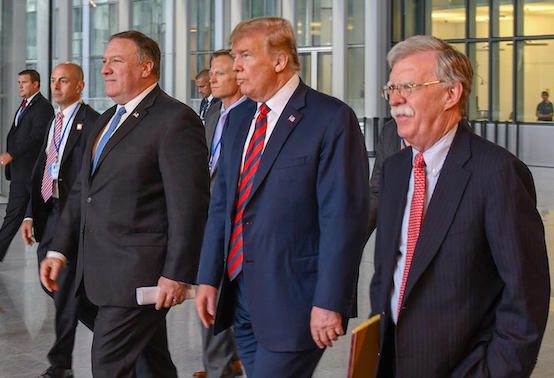The Many Failures of Trump’s Iran Policy

Nicholas Miller reviews Trump’s failing Iran policy and calls out the hawks that have advocated for it:
How are we to explain why these specious arguments continue to be advanced, in the face of all evidence to the contrary? For some in the administration, it may simply be a matter of grasping at straws to rationalize a failed policy. For anti-Iran hawks, though, who have advocated regime change in Iran, something deeper is likely at play. They almost certainly know that Iran will not agree to the laundry list of demands the Trump administration has advanced. Instead, they hope the sanctions will lead the regime to collapse, or to lash out in a way that triggers U.S. military action. For them, Iran’s increasing aggressiveness may be a feature rather than a bug.
If Trump is serious about abandoning regime change campaigns and avoiding another war in the Middle East, he needs to accept that his current policy is failing and adopt a new approach. This could start with easing sanctions on Iran and entering into a dialogue to bring them back into compliance with the nuclear deal. Continuing on the current course is a recipe for crisis and war.
As Miller correctly suspects, a recipe for crisis and war is what Iran hawks have been working on for a long time. They have taken one poorly-informed militarist of a president, mixed in a batch of hard-line advisers, added a large dose of sanctions, and allowed it to cook for more than a year. If they cannot immediately get the war they want, they will settle for a permanent crisis atmosphere that allows them to justify increasingly aggressive policies in the region until they get another pretext for escalation. It may seem baffling to many Americans that anyone would actively seek out conflict with another country, especially one that poses no real threat to us, but this is what they have done and continue to do. The important thing to remember is that regime changers consider the mere existence of these other governments to be intolerable, and they are willing to harm U.S. interests in the pursuit of destroying them.
Miller is right that Trump’s stated policy towards Iran has failed. Iran is much less likely to negotiate on anything than it was before Trump reneged on the deal, the regime has not made any of the changes in its behavior that the administration wants, and it has dug in its heels to resist the pressure campaign. I would add that the policy isn’t going to succeed in achieving the unstated hawkish goal of regime change, so the policy is a failure by either standard. More to the point, the policy was bound to fail. Sanctions typically don’t change regime behavior, and they are extremely unlikely to force regime collapse. “Maximum pressure” provokes resistance. It doesn’t cause the other government to fall or surrender.
I don’t know that the president is capable of acknowledging that his economic war on Iran won’t get him what he wants, but if he can’t change course the U.S. and Iran will remain dangerously close to war for the remainder of his presidency. That is a significant failure in its own right. It is essentially a repeat of his reckless belligerence towards North Korea, but this time there are no empty photo-op summits to cover up the failure. No matter what Iran hawks may want, bringing our two countries to the brink of a completely unnecessary war because of a crisis created by our government is a breathtaking failure of leadership and policymaking. The fact that these hawks in and around the administration are getting exactly what they want by making war with Iran more likely should utterly discredit them now and in all future foreign policy debates, but of course it won’t and they will still be agitating for the same brain-dead policies ten years from now.
The debate over Iran policy is a useful case study in how there is absolutely no accountability in our foreign policy debates. Vocal supporters of disastrous policies in the past are able to serve at the highest levels of government, and in those positions they are able to promote reckless and aggressive policies that risk causing similar or even worse disasters. The pundits and analysts that served as cheerleaders for previous regime change wars pay no price for having been horribly wrong, and so they continue to advocate for many of the same destructive and illegal policies against new targets. Hawks get away with distorting evidence, manipulating intelligence, and making things up out of thin air without suffering any loss of influence, and they pay no penalty for the falsehoods they spread. Because there is no price for being consistently wrong and there isn’t even really a price to be paid for being dishonest, hawks have learned that they can say just about anything to advance their cause without ever having to answer for it later. Is it any wonder that our foreign policy lurches from one failure to the next when the people responsible for the previous failures never go away?
Comments